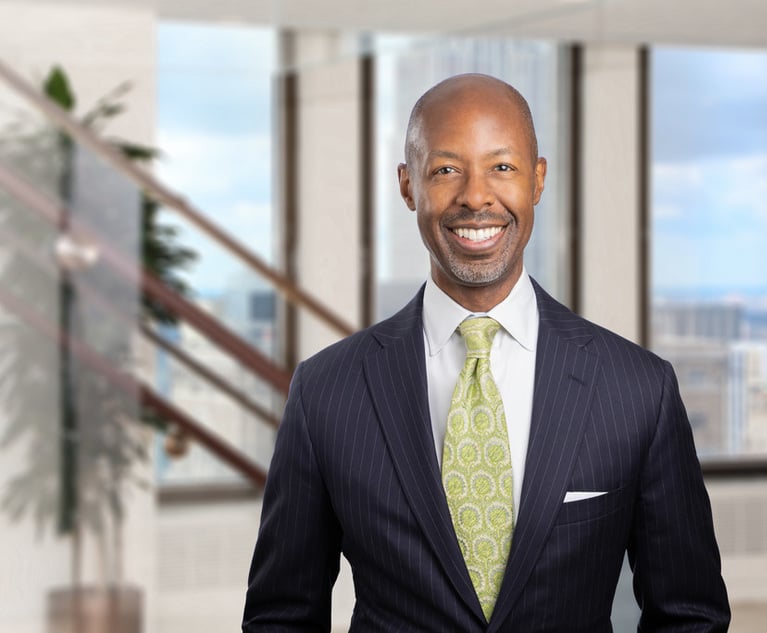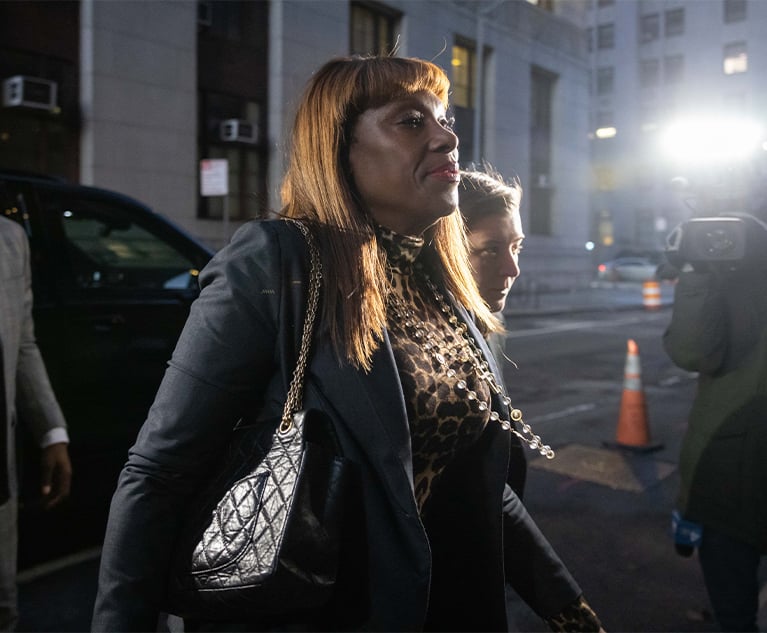 From left: Mary-Christine Sungaila, Douglas NeJaime, Joshua Matz and Melissa Sherry at the ABA's LGBT-rights forum at the Marriott Marquis Hotel in Times Square on Tuesday. Photo: Jason Grant/NYLJ
From left: Mary-Christine Sungaila, Douglas NeJaime, Joshua Matz and Melissa Sherry at the ABA's LGBT-rights forum at the Marriott Marquis Hotel in Times Square on Tuesday. Photo: Jason Grant/NYLJABA Panel on LGBT-Rights Litigation Expresses Anxiety and Hope for Post-Kennedy Supreme Court
Given the makeup of the U.S. Supreme Court, “the fear is that [the justices] are going to actively take up cases” and hand down rulings that will undercut gay and transgender-rights issues “we've already won," a panelist said.
April 30, 2019 at 07:11 PM
7 minute read
Speakers at an American Bar Association-sponsored panel Tuesday on litigating LGBT-rights issues before a post-Justice Anthony Kennedy U.S. Supreme Court expressed anxiety and some strains of hope for current and future cases.
At the same time, they outlined litigation strategies that included both moving the fight back to the state courts and directing the federal courts to precedent that Kennedy helped to create.
“The Supreme Court is not the only court in the country,” said panelist Joshua Matz, an appellate and constitutional litigator at Kaplan Hecker & Fink and a former law clerk to Justice Anthony Kennedy, who was known for being both a gays-rights champion and a crucial swing vote on the high court.
“In some respects,” Matz said, “I think what we're about to see [is that] it will be very difficult to affirmatively prevail” in the federal courts on a number of gay and transgender-rights issues, especially at the Supreme Court, “unless [justices] are bound by stare decisis.”
But Matz pointed out that it has only been in the last six years or so that the gay- and transgender-rights movement has actively looked to the federal courts and the Supreme Court to advance its cause.
For decades, the movement had focused on using state courts and state legislatures to make progress and, in fact, the strategy often had been “don't go to the Supreme Court and don't make arguments that will get you there,” he said.
Now, given the makeup of the Supreme Court, with the more conservative Justice Brett Kavanaugh replacing Kennedy and with President Donald Trump's other appointment of Justice Neil Gorsuch, “the fear is that [the justices] are going to actively take up cases” and issue rulings that will undercut gay and transgender-rights issues “that we've already won,” Matz said.
Therefore, on certain key issues “we may be playing defense in the federal courts” while taking up issues in the state courts, said Matz, who noted that he is proudly gay and married, and that some of the rights issues are personal to him.
Still, neither Matz nor any of the panelists indicated that the battle for increased LGBT-community rights, through decisions of the Supreme Court, is lost or will not be fought vigorously.
The panel, which included Melissa Sherry, a Latham & Watkins partner and member of the firm's Supreme Court & Appellate Practice, and Douglas NeJaime, a Yale Law School professor focused on family and constitutional law, made clear that Kennedy's court writings and a number of past court decisions left precedent and language that will be used to influence the high court's more conservative, textualist-based justices.
Led by moderator Mary-Christine Sungaila, a partner and appellate litigator at Haynes and Boone, the panel addressed key LGBT-rights issues now moving through the courts, including an issue that just last week the Supreme Court announced it will decide: Whether the nation's major workplace anti-bias law, Title VII of the 1964 Civil Rights Act, bans discrimination on the basis of sexual orientation and transgender status.
The U.S. Courts of Appeals for the Second and Seventh circuits have split with the Eleventh Circuit on the issue; and the Equal Employment Opportunity Commission and the Trump administration have parted ways on it. The EEOC has reportedly said that Title VII's protections do extend to gay and transgender workers while the Trump administration has reportedly said they don't.
Matz pointed out that despite many in the gay and transgender communities being in an uproar after the Supreme Court's announcement—Twitter, he said, was full of “fire emojis”—it “was the right thing to do” for the justices to grant cert on the Title VII issue given the circuit courts' split.
He and other panelists noted that the cases and issue may present an interesting question for the more conservative textualists on the high court, since Title VII has been read by some courts to mean that workplaces can't discriminate against employees based on their sex and who they love.
Moreover, he said, the Supreme Court has made it clear that part of Title VII's purpose was to remove sex as a factor in employment situations. In addition, Matz said that some courts have said the 1964 law stands for not treating employees differently based of sexual orientation, as that would be using a “stereotype” as the basis for a decision.
But a conservative judge on the Seventh Circuit has essentially said that she did not believe the 1964 law, when written, was contemplating gay and transgender situations, and a Second Circuit judge has focused on the law's purpose being “to end the scourge of gender inequality” rather than it addressing gay and transgender rights, Matz pointed out.
The worry, he said, is that despite textualist arguments saying that the law applies to the LGBT community, the court's majority of “more conservative judges will just not … go there” and instead will ”gut the entire framework of sex discrimination law.”
“This is one of these cases that has incredibly high stakes,” he said, adding, “we're just going to have to wait and see.”
The panel, titled “LGBT+ Issues in a Post-Kennedy World,” opened a LGBT-rights forum sponsored by the ABA and being held Tuesday and Wednesday at the Marriott Marquis Hotel in Times Square.
In a later panel discussion on recent federal cases that have pitted claims of religious freedom—or the right to be free from sinning—against protected LGBT rights, NeJaime, the Yale Law professor, pointed out that “religious liberty has historically been championed” by liberals, but now conservative Christian groups are using such arguments against laws protecting gay and transgender rights.
The new line of cases and arguments are “targeted at the people whose rights were recently” protected by various court rulings, he said, referring to cases such as the Masterpiece Cakeshop case decided by the U.S. Supreme Court last year.
“These are not claimants from a minority religion asking for rights,” NeJaime said.
At another point in Tuesday's discussion, Melissa Sherry of Latham & Watkins outlined the issue of gender equality in the military and the jurisprudence created by President Trump's announcement, via Tweet, of a ban on transgender people in the military.
She pointed out that a vote by five Supreme Court justices to stay a preliminary injunction on the ban was “a pretty significant preview, I think, if the cases go back before the [Supreme] Court, where they might be headed.”
According to the ABA, the forum, the second such one sponsored by the ABA in the last few years, is being tied to this year's 50th anniversary of the Stonewall riots, which many credit with sparking the LGBT-rights movement.
After the forum ends Wednesday, a three-day Section of Litigation & Solo, Small Firm and General Practice Division (GPSolo) CLE Conference will begin at the Marriott.
This content has been archived. It is available through our partners, LexisNexis® and Bloomberg Law.
To view this content, please continue to their sites.
Not a Lexis Subscriber?
Subscribe Now
Not a Bloomberg Law Subscriber?
Subscribe Now
NOT FOR REPRINT
© 2024 ALM Global, LLC, All Rights Reserved. Request academic re-use from www.copyright.com. All other uses, submit a request to [email protected]. For more information visit Asset & Logo Licensing.
You Might Like
View All
Attorneys 'On the Move': Structured Finance Attorney Joins Hunton Andrews Kurth; Foley Adds IP Partner
4 minute read

NY Civil Liberties Legal Director Stepping Down After Lengthy Tenure

Former Top Aide to NYC Mayor Is Charged With Bribery Conspiracy
Trending Stories
- 1Call for Nominations: Elite Trial Lawyers 2025
- 2Senate Judiciary Dems Release Report on Supreme Court Ethics
- 3Senate Confirms Last 2 of Biden's California Judicial Nominees
- 4Morrison & Foerster Doles Out Year-End and Special Bonuses, Raises Base Compensation for Associates
- 5Tom Girardi to Surrender to Federal Authorities on Jan. 7
Who Got The Work
Michael G. Bongiorno, Andrew Scott Dulberg and Elizabeth E. Driscoll from Wilmer Cutler Pickering Hale and Dorr have stepped in to represent Symbotic Inc., an A.I.-enabled technology platform that focuses on increasing supply chain efficiency, and other defendants in a pending shareholder derivative lawsuit. The case, filed Oct. 2 in Massachusetts District Court by the Brown Law Firm on behalf of Stephen Austen, accuses certain officers and directors of misleading investors in regard to Symbotic's potential for margin growth by failing to disclose that the company was not equipped to timely deploy its systems or manage expenses through project delays. The case, assigned to U.S. District Judge Nathaniel M. Gorton, is 1:24-cv-12522, Austen v. Cohen et al.
Who Got The Work
Edmund Polubinski and Marie Killmond of Davis Polk & Wardwell have entered appearances for data platform software development company MongoDB and other defendants in a pending shareholder derivative lawsuit. The action, filed Oct. 7 in New York Southern District Court by the Brown Law Firm, accuses the company's directors and/or officers of falsely expressing confidence in the company’s restructuring of its sales incentive plan and downplaying the severity of decreases in its upfront commitments. The case is 1:24-cv-07594, Roy v. Ittycheria et al.
Who Got The Work
Amy O. Bruchs and Kurt F. Ellison of Michael Best & Friedrich have entered appearances for Epic Systems Corp. in a pending employment discrimination lawsuit. The suit was filed Sept. 7 in Wisconsin Western District Court by Levine Eisberner LLC and Siri & Glimstad on behalf of a project manager who claims that he was wrongfully terminated after applying for a religious exemption to the defendant's COVID-19 vaccine mandate. The case, assigned to U.S. Magistrate Judge Anita Marie Boor, is 3:24-cv-00630, Secker, Nathan v. Epic Systems Corporation.
Who Got The Work
David X. Sullivan, Thomas J. Finn and Gregory A. Hall from McCarter & English have entered appearances for Sunrun Installation Services in a pending civil rights lawsuit. The complaint was filed Sept. 4 in Connecticut District Court by attorney Robert M. Berke on behalf of former employee George Edward Steins, who was arrested and charged with employing an unregistered home improvement salesperson. The complaint alleges that had Sunrun informed the Connecticut Department of Consumer Protection that the plaintiff's employment had ended in 2017 and that he no longer held Sunrun's home improvement contractor license, he would not have been hit with charges, which were dismissed in May 2024. The case, assigned to U.S. District Judge Jeffrey A. Meyer, is 3:24-cv-01423, Steins v. Sunrun, Inc. et al.
Who Got The Work
Greenberg Traurig shareholder Joshua L. Raskin has entered an appearance for boohoo.com UK Ltd. in a pending patent infringement lawsuit. The suit, filed Sept. 3 in Texas Eastern District Court by Rozier Hardt McDonough on behalf of Alto Dynamics, asserts five patents related to an online shopping platform. The case, assigned to U.S. District Judge Rodney Gilstrap, is 2:24-cv-00719, Alto Dynamics, LLC v. boohoo.com UK Limited.
Featured Firms
Law Offices of Gary Martin Hays & Associates, P.C.
(470) 294-1674
Law Offices of Mark E. Salomone
(857) 444-6468
Smith & Hassler
(713) 739-1250






